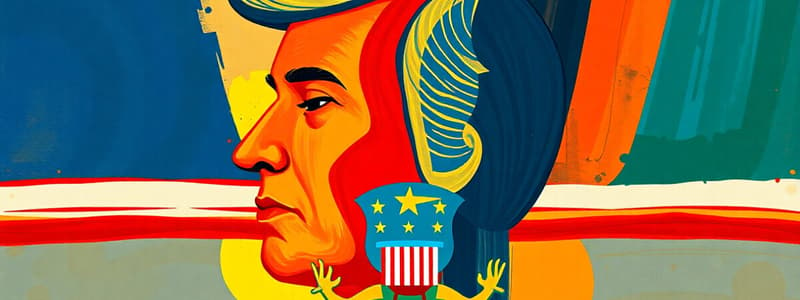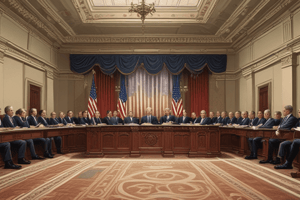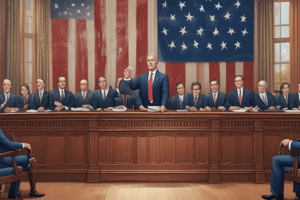Podcast
Questions and Answers
What does the term 'clemency' refer to in a legal context?
What does the term 'clemency' refer to in a legal context?
- The authority to imprison individuals indefinitely
- The power to reduce penalties for crimes (correct)
- The power to sentence someone to death
- The ability to make laws for federal crimes
What is a primary criticism of the Electoral College system?
What is a primary criticism of the Electoral College system?
- It ensures smaller states have more say in elections.
- It disregards the popular vote. (correct)
- It promotes voting efficiency among citizens.
- It effectively reduces the impact of voter fraud.
What is true about the process of issuing a pardon?
What is true about the process of issuing a pardon?
- It implies that the person was innocent of the crime
- It can only occur before a person is convicted
- It absolves a person of consequences for federal crimes (correct)
- It requires a unanimous decision from Congress
What is required for the House of Representatives to begin the impeachment process?
What is required for the House of Representatives to begin the impeachment process?
Which statement accurately describes the Electoral College system?
Which statement accurately describes the Electoral College system?
What does an executive order primarily represent?
What does an executive order primarily represent?
What role does the Chief Justice of the Supreme Court play during an impeachment trial?
What role does the Chief Justice of the Supreme Court play during an impeachment trial?
Which of the following defines a 'lame duck' official?
Which of the following defines a 'lame duck' official?
What role do executive agencies play in the government?
What role do executive agencies play in the government?
What does the 25th Amendment provide for regarding presidential succession?
What does the 25th Amendment provide for regarding presidential succession?
What is one of the qualifications required to be president?
What is one of the qualifications required to be president?
Which power allows the president to recommend legislation to Congress?
Which power allows the president to recommend legislation to Congress?
What is a key characteristic of implied powers of the president?
What is a key characteristic of implied powers of the president?
What happens if the president does nothing with a bill when Congress is in session?
What happens if the president does nothing with a bill when Congress is in session?
Which power is NOT explicitly stated in the Constitution but has emerged over time for the president?
Which power is NOT explicitly stated in the Constitution but has emerged over time for the president?
What is the main ruling from Clinton v. City of New York (1998) regarding the line item veto?
What is the main ruling from Clinton v. City of New York (1998) regarding the line item veto?
In what scenario does a pocket veto occur?
In what scenario does a pocket veto occur?
What is the role of the president as 'Chief of Party'?
What is the role of the president as 'Chief of Party'?
Flashcards
Lame Duck Congress
Lame Duck Congress
A Congress whose members are serving during a period between an election and the next election term, where the new Congress will assume office, and they have diminished political power and influence.
Judicial Checks
Judicial Checks
The power of the courts to review and potentially invalidate actions of the executive and legislative branches.
Clemency
Clemency
Leniency in punishment for a crime.
Commutation
Commutation
Signup and view all the flashcards
Reprieve
Reprieve
Signup and view all the flashcards
Pardon
Pardon
Signup and view all the flashcards
Executive Order
Executive Order
Signup and view all the flashcards
Executive Agencies
Executive Agencies
Signup and view all the flashcards
Electoral College
Electoral College
Signup and view all the flashcards
Faithless Elector
Faithless Elector
Signup and view all the flashcards
Presidential Qualifications
Presidential Qualifications
Signup and view all the flashcards
Enumerated Presidential Powers
Enumerated Presidential Powers
Signup and view all the flashcards
Implied Presidential Powers
Implied Presidential Powers
Signup and view all the flashcards
Chief Executive
Chief Executive
Signup and view all the flashcards
Commander-in-Chief
Commander-in-Chief
Signup and view all the flashcards
Legislative Power (President)
Legislative Power (President)
Signup and view all the flashcards
Veto Power
Veto Power
Signup and view all the flashcards
Line-Item Veto
Line-Item Veto
Signup and view all the flashcards
Pocket Veto
Pocket Veto
Signup and view all the flashcards
Executive Privilege
Executive Privilege
Signup and view all the flashcards
Executive Order
Executive Order
Signup and view all the flashcards
Electoral College
Electoral College
Signup and view all the flashcards
Impeachment
Impeachment
Signup and view all the flashcards
Lame Duck
Lame Duck
Signup and view all the flashcards
Political Parties
Political Parties
Signup and view all the flashcards
Voter Registration
Voter Registration
Signup and view all the flashcards
Presidential Succession
Presidential Succession
Signup and view all the flashcards
Article II, Section I, Clause VI
Article II, Section I, Clause VI
Signup and view all the flashcards
25th Amendment
25th Amendment
Signup and view all the flashcards
Presidential Succession Act of 1947
Presidential Succession Act of 1947
Signup and view all the flashcards
Study Notes
Unit 2 Content: Insuring Domestic Tranquility
- The unit focuses on the topic of ensuring domestic tranquility.
Presidential Qualifications
- To be president, a candidate must be 35 years old.
- A candidate must be born in the U.S.
- A candidate must have lived in the U.S. for at least 14 years.
Presidential Powers
-
Expressed/Enumerated (Formal): Powers explicitly stated in the Constitution.
- These powers are explicitly spelled out in the Constitution.
-
Implied/Informal/Inherent: Powers not explicitly stated but assumed based on needs of the office or the country.
- These powers evolved over time due to the evolving needs of the office and country.
Enumerated Powers of the President
- Chief Executive: Controls Executive Branch.
- Diplomatic Powers: Negotiates treaties with foreign governments and receives ambassadors. These actions require Senate approval.
- Military Powers: Commander-in-chief of the armed forces.
- Legislative Powers: Can propose and pass laws; can veto legislation.
- Judicial Powers: Nominates judges (including Supreme Court justices), ambassadors, and other federal officers. These nominations require Senate approval.
Judiciary
- The U.S. President appoints federal judges, including Supreme Court justices.
- The illustration shows the number of federal judges appointed by Trump and Biden, including District Courts, Courts of Appeals, and Supreme Court judges.
- Trump appointed 231 federal judges.
- Biden appointed 179 federal judges
Implied Powers of the President
- War Powers: Guides political party, is a figurehead, and delivers speeches.
- Chief of Party: Leads political party.
- Chief of State: Honors and greets people.
- Emergency Powers: Acts to address unforeseen issues.
- Executive Privilege: Keeps some communications confidential.
- Executive Orders: Issues directives to government agencies.
- Power of Recognition: Grants official recognition.
- Guardian of the Economy: Acts to ensure economic wellbeing.
Legislative Checks
- Veto: President can reject legislation.
- Line Item Veto: Rejected by the Supreme Court, executive power to reject portions of legislation.
Pocket Veto
- If Congress is not in session, a bill becomes law only if it is not actively vetoed by the President, within a 10-day period.
Judicial Checks
- Clemency (pardons, reprieves, commutations): Leniency regarding a punishment, power to absolve, and can free individuals of criminal consequences.
- Pardons: Forgiving someone of consequences for federal crimes. This can happen before or after conviction. It doesn’t imply innocence.
- Power to reduce (commute) penalty: Reducing the severity of criminal penalties.
- Cancel/postpone: Postponing or canceling a sentence (usually for capital punishment)
Executive Order
- President issues a directive to the Executive Branch.
- An executive order is a directive from the president to a government agency.
- Exectutive Orders have the same weight as law.
- Subject to judicial review, though easily repealed.
Electoral College
- System for electing a president involving electoral votes instead of a popular vote.
- The candidate with the most popular votes in a state receives all electoral votes in that state. (48 states).
- In Maine and Nebraska, electoral votes are distributed based on the winner of each congressional district.
- A presidential candidate needs 270 electoral votes to win.
Impeachment
- The president, like other federal officials, can be impeached for "high crimes and misdemeanors."
- The House of Representatives starts impeachment process—a majority vote needed to pass articles of impeachment.
- The Senate then tries the case; the Chief Justice of the Supreme Court presides.
- A two-thirds vote in the Senate is needed to convict and remove the official from office.
Lame Duck
- An elected official in the final period of office, after the election of a successor.
- Actions taken are less significant politically, due to lack of power as the position is about to change.
Role of Political Parties
- Organize voters around a common message
- Register Voters
- Fundraise
- Energize voters
- Work to elect party members
- Educate voters
- Train candidates
Political Ideologies
- Liberals: Favor government action to achieve equality and protect individual rights and liberties.
- Conservatives: Prioritize personal responsibility, limited government, and free markets.
Presidential Succession
- Qualifications to be president.
- Constitutional details on succession.
- Presidential Succession Act of 1947 (established a list of successors).
- 25th Amendment (explains presidential succession if a president resigns or is unable to fulfill their duties).
Cabinet Members
- List of the current Cabinet members.
Studying That Suits You
Use AI to generate personalized quizzes and flashcards to suit your learning preferences.



